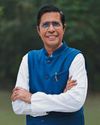
SHALINI GOYAL BHALLA MD, International Council for Circular Economy
India is one of the world's top users of plastics, and the industry is anticipated to experience exponential growth in future. While plastics have many advantages, there is growing worry about how they affect the environment, particularly marine ecosystems. India faces a pressing challenge in managing plastic waste, with its growing population and consumption patterns contributing to significant environmental damage.
To address this issue and promote sustainable development, India must embrace circularity in plastics. A circular economy approach aims to reduce plastic waste, maximise the value of resources, and minimise the environmental impact. Circularity in plastics can play a significant part in reducing plastic consumption. Increasing recycling and reuse, and creating biodegradable substitutes are all part of the circular plastic economy.
To promote circularity in plastics, India can introduce new policies that can facilitate the transition. Use of biodegradable plastics and alternative materials such as paper, cloth, and glass are gaining traction. The production and sale of non-biodegradable plastics can be regulated, and incentives can be provided to encourage the use of biodegradable alternatives. Secondly, the introduction of a circular economy roadmap that outlines the targets and actions for transitioning towards circularity can create a framework for implementation. Thirdly, Extended Producer Responsibility (EPR) that mandates producers to take back and recycle the plastics they produce is helping to create a closed-loop system.
Diese Geschichte stammt aus der June 2023-Ausgabe von Outlook Business.
Starten Sie Ihre 7-tägige kostenlose Testversion von Magzter GOLD, um auf Tausende kuratierte Premium-Storys sowie über 8.000 Zeitschriften und Zeitungen zuzugreifen.
Bereits Abonnent ? Anmelden
Diese Geschichte stammt aus der June 2023-Ausgabe von Outlook Business.
Starten Sie Ihre 7-tägige kostenlose Testversion von Magzter GOLD, um auf Tausende kuratierte Premium-Storys sowie über 8.000 Zeitschriften und Zeitungen zuzugreifen.
Bereits Abonnent? Anmelden

From Chandni Chowk to Global Recognition
For Manish Aggarwal, director at Bikano, Bikanervala Foods, the family business was not just a responsibility but a passion he took to the global stage

Spotting AI Scams
Al has become an integral part of our lives, from customer service no insurance claims. But it is also becoming a tool for fraudsters who use it to scam individuals and corporations

Let a Hundred Flowers Bloom
On the banks of the Ganges in industrial Kanpur, a start-up has blossomed that turns waste flowers into incense

BATTERY LOW
India produces enough green energy to power many of its largest cities yet lacks the storage to use it efficiently. A nation blazing forward must leap ahead in battery technology to stay on course

We Have Everything Going for Rajasthan
Rajyavardhan Singh Rathore, Rajasthan’s industry and commerce minister, tells Pushpita Dey why the state is suited to become a hub for investments.

Dairy and Other Dilemmas
India’s refusal to open its dairy market has complicated trade negotiations for years. As global partners demand concessions, is the cost of protectionism outweighing benefits?

Riding in a Maze
As gig workers ride into an uncertain future with little more than a smartphone and a bike, the government is struggling to arrange a socialsafety net. But millions without social security is recipe for disaster

BIRLA'S BIGGEST BATTLE
As Kumar Mangalam Birla completes 30 years at the helm of the Aditya Birla Group, he has a battle to defend his businesses and conquer new ones

THE INNOVATION LEAP
India dreams of becoming a product nation. But unless the corporate sector significantly increases spending on R&D, the country will continue to lag behind global peers

EDUCATION BUDGET MUST DOUBLE EVERY 3 YEARS
Veezhinathan Kamakoti, a renowned academic and director of Indian Institute of Technology Madras, tells Deepsekhar Choudhury on what technology sovereignty means for India and how it can propel the country towards its vision of becoming a developed nation by 2047.